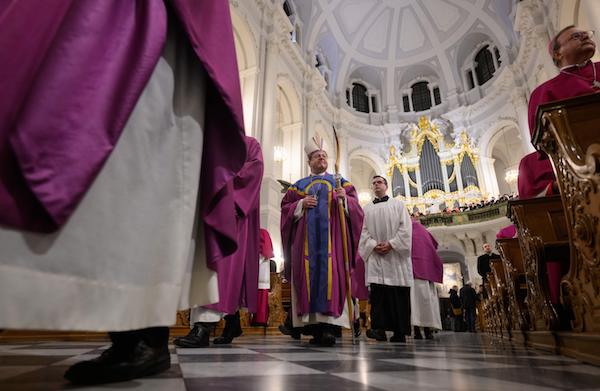Controversy over the Synodal Path initiative for Church reform has overshadowed the German bishops’ spring plenary, which began in Dresden on 27 February.
Shortly before the conference met, five delegates of the reform initiative resigned, among them the city dean of Bonn, Fr Wolfgang Picken, the Cologne archdiocesan clergy’s representative in the Synodal Path.
At the opening of the plenary, the apostolic nuncio to Germany, Archbishop Nikola Eterovic, informed the German bishops that he had been officially commissioned to define more precisely the Vatican’s “no” to the German Synodal Path’s plans to establish a “synodal council”, in which bishops and lay persons would share in decision making.
“If the 16 January letter is interpreted correctly, not even a diocesan bishop can establish a synodal council – not at the diocesan nor at the parish level,” Eterovic emphasised.
In a letter specifically approved by Pope Francis dated 16 January, the Vatican informed the German synodal path initiative that it did not have the competence to establish a nationwide permanent “synodal council”.
Despite the Vatican’s letter, several German bishops had declared that they intended to proceed with the council project.
“Instead of founding new institutions and thereby risking an increase of bureaucracy, the diocesan bodies that are already in existence need to be revitalised in a synodal spirit,” Eterovic said.
In his opening address, conference president Bishop Georg Bätzing informed the bishops that he had answered the Vatican letter of 16 January letter the previous week.
In his reply he had once again described the aim of the “synodal committee” (“synodaler ausschuss”) which was to prepare a “synodal council” (“synodaler rat”), Bätzing said.
He had also recalled that the German bishops had understood that talks between the German bishops’ conference and the Vatican would continue.
“We are prepared at short notice and at any time to come to Rome and continue our talks with the Vatican dicasteries,” he said. Communication between the Vatican and the German bishops was “difficult”, he added.
He said his reply to the Vatican letter would be published in due course.
The bishops would devote a whole day to discussing the Synodal Path for reform, Bätzing continued. The aim was to achieve a “unanimous but not uniform” viewpoint among the German bishops. The large majority of bishops wanted the synodal path to succeed, he said.
Bätzing admitted that the situation was “critical” for the German Synodal Path reform process and “must be taken very seriously”.
Many objections had been raised against the Synodal Path both in the Curia and in the world Church. “So we are not pursuing the Synodal Path in peace,” he declared.
But he rejected the repeated accusation that the German Synodal Path was leading to a schism. “Those who talk of a schism expect to get something [from a schism]. I do not talk about schism as no-one wants one”.
The planned “synodal commission” would be set up the following week at the synodal path meeting from 9-11 March. The commission would organise the “synodal council” in such a way that it would conform to church law, Bätzing assured the bishops.
Today, the second day of the plenary, the Archbishop of Munich, Cardinal Reinhard Marx, called for more courage for Church reform.
“Why is there so much fear? Why are people so worried about what might happen? Perhaps the attempts to achieve synodality which we in Germany and beyond are experiencing at the moment are the beginning of a beginning,” Marx suggested.



 Loading ...
Loading ...